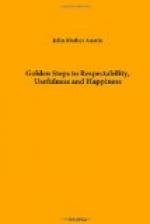“Teach me the flattering
paths to shun,
In which the thoughtless
many run;
Who for a shade the
substance miss,
And grasp their ruin
in their bliss.”
A well-established habit of practical observation, enables the youthful to guard against the mistakes of conduct, into which others have fallen, and to make the shortcomings of their fellow-beings, salutary admonitions for their own instruction. When thoughtful, observing young persons, see an individual do a mean, unmanly action, they will reflect much upon it. They will notice how contemptible it makes him appear—how it degrades him in the estimation of the honorable and high-minded—how it belittles him in the view of society at large—and how unworthy it makes him appear even in his own eyes. These observations, if faithfully made, will guard them against like acts themselves.
When they behold one arraigned at the bar of public justice, to answer to the offended laws of his country, they will make it a salutary lesson of instruction. They will realize the deceptive and ruinous nature of wrong-doing—how, while promising them the very elixir of happiness, it pours naught but bitterness and poison into the cup of life, entailing degradation and wretchedness upon its victims. They will become satisfied of the solemn truth of the words of the Most High, that “though hand join in hand, the wicked shall not be unpunished.”
When they see neighbors, who might promote each other’s enjoyments, by living peaceably together, fall out in regard to some trivial misunderstanding, and engage in angry disputes, and a bitter warfare, disturbing the harmony of the neighborhood, and destroying their own happiness—the young who exercise practical observation, will be instructed, to avoid similar troubles in their own affairs. They will realize the folly and blindness of such a course, and the necessity of exercising a forbearing and forgiving spirit, and the wisdom of submitting to injuries, if need be, rather than to become involved in angry recriminations and hostilities.
Thus by a constant habit of observation and reflection, the youthful can turn the failings of others to their own account. As the industrious bee extracts honey from the most nauseous substances, so can the thoughtful and observing draw instruction not only from the example of the wise, but from the folly of the wicked!




